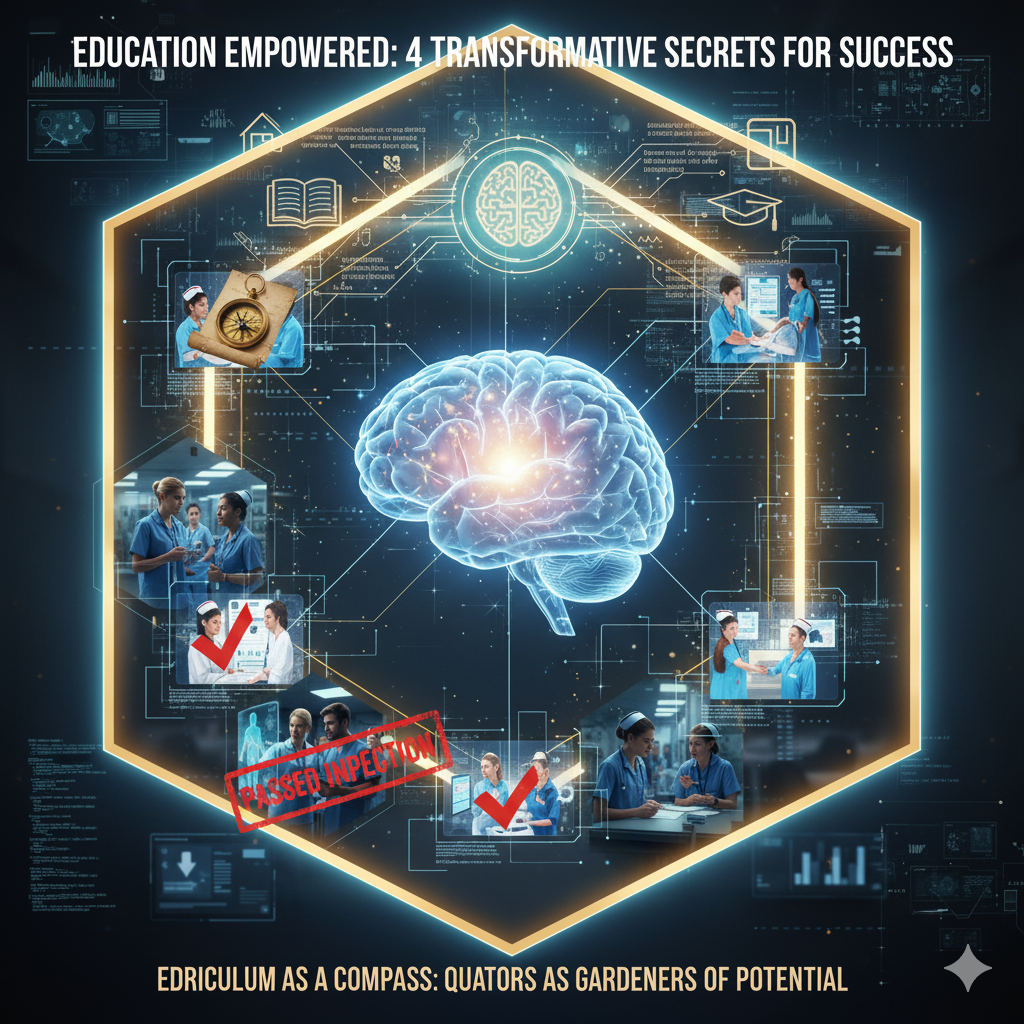“Beyond Boundaries: The Heart of Nursing Education”
Like any great building, a great education has architecture, a hidden framework of philosophy, strategy, and values that hold everything up. For most of us, this structure is invisible. We experience education as a series of familiar components: course outlines, lectures, and exams. We see the syllabus as the blueprint and the grade as the final product. But a nursing student’s recent journey into becoming an educator offers a rare look at the blueprints.
Through a series of personal reflections, this Master of Science in Nursing student uncovered a world where a curriculum is a philosophical statement and teaching is more like tending a garden than delivering a lecture. Their insights reveal that the most crucial elements shaping an effective education are often unseen by the students themselves. Here are four of the most powerful takeaways from that journey.
Curriculum as a Compass: Guiding Philosophy, Not Just Paper
The students began their course with a common, limited understanding of a curriculum as little more than a “course outline and learning outcomes.” This narrow view was quickly shattered in what they described as an “eye-opening and, to some extent, devastating” realization about the true scope and significance of curriculum design.
They learned that a curriculum is not merely a plan for teaching, but a direct reflection of an institution’s core values, mission, and guiding philosophy. It must also align with national standards set by governing bodies, such as the Pakistan Nursing Council, to ensure it meets rigorous benchmarks. This understanding transformed the curriculum from a simple administrative tool into a profound statement of purpose.
It was enlightening to realize that a curriculum is not just a teaching tool, but a reflection of institutional values, philosophy, and national standards..
This discovery reveals a universal truth: every course outline, no matter how simple it seems, is an expression of a deeper educational philosophy that dictates what is valued and why.
“Cultivating Growth: Educators as Gardeners of Potential”
How should we think about the role of a teacher? An activity that involved choosing a personal metaphor for teaching provided a simple but powerful answer. The student chose the metaphor of a teacher as a “gardener.”
This metaphor reframes the entire purpose of education. A gardener does not force a plant to grow; they create the conditions for it to thrive. As the student explained, a teacher, like a gardener, is responsible for providing a comfortable environment, enriching students with “nutrients” like knowledge and skills and focusing on their holistic growth. This simple analogy is impactful because it perfectly visualizes a core pedagogical theory: a constructive approach to learning. It shifts the educator’s role from someone who merely conveys knowledge to a facilitator who “facilitates learning rather than simply conveying knowledge.”
This reframing illustrates a core tenet of modern pedagogy: true learning happens not through transmission, but through intentional cultivation.
“Quality Beyond Checklists: True Learning Can’t Be Inspected”
When an institution passes an official inspection, we assume it guarantees a high-quality education. However, a deep dive into the guidelines and the corresponding inspection checklist revealed a surprising gap. The student found that while the checklist is a useful and practical tool, its narrow focus can miss the deeper, more visionary goals outlined in the official guidelines.
The analysis revealed that an institution could successfully pass an inspection while having significant weaknesses. The checklist underrepresented several key components of an excellent educational program:
- A strong research culture
- Continuous faculty development and career advancement
- Long-term financial sustainability
- A positive and ethical learning environment
- Ongoing quality improvement processes
This creates a dangerous illusion: an institution can be fully compliant on paper yet fail to foster the very culture of excellence the guidelines were created to promote. It’s a stark reminder for any organization that metrics for compliance are not the same as measures of quality.
“Learning in Action: Teaching Happens When You’re Tested”
One of the most effective learning experiences came from a session that was intentionally uncomfortable. Students were tasked with designing a teaching plan for a case study but were faced with unexpected challenges: they were forbidden from using digital resources, and partway through, a group member was secretly removed from each team.
The student described initial feelings of confusion and anxiety, which only transformed into an “appreciation for the learning strategy” once the purpose was revealed. The removed students had been assigned to act as evaluators, assessing their own group’s performance using a formal checklist. This uncomfortable simulation was effective because it was an act of authentic learning—it forced students to confront the messy, unpredictable, and resource-constrained realities of actual teaching, moving far beyond textbook theory.
“The Hidden Framework: Architecture of Lifelong Learning”
Effective education is not an accident. As these reflections show, it is built on a complex and thoughtful architecture of philosophy, values, and continuous improvement that often goes unseen. From the institutional mission embedded in a curriculum to the carefully constructed discomfort of a single classroom activity, the most important elements of learning are rarely found on the syllabus.
The next time you’re in a classroom or a training session, what hidden philosophies or checklists might be shaping your experience?


Nursing education is the backbone of healthcare. Loving this theme! Nursing education is all about growth, empathy, and making a difference ❤️
Very well written blog.
It shows the importance of adult and active learning contributing to students learning.
Also signifies the students motivation in achieving educational success.
This reflection highlights how true learning happens outside our comfort zone. The idea of using real challenges to build adaptability and deeper understanding shows what authentic education should look like. Perfectly written.
Very well done sir